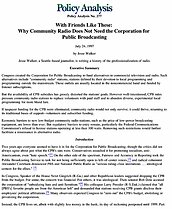But the availability of CPB subsidies has grossly distorted the stations’ goals. However well-intentioned, CPB rules pressure community radio stations to replace volunteers with paid staff and to abandon diverse, experimental local programming for more bland fare.
If taxpayer funding for the CPB were eliminated, community radio would not only survive; it could thrive, returning to its traditional bases of support–volunteers and subscriber funding.
Economic barriers to new low-budget community radio stations, such as the price of low-power broadcasting equipment, are lower than ever. But regulatory barriers to entry remain, particularly the Federal Communications Commission’s refusal to license stations operating at less than 100 watts. Removing such restrictions would further facilitate a renaissance in alternative radio.

